ENGLISH IN THE CLASSROOM Why speak English in


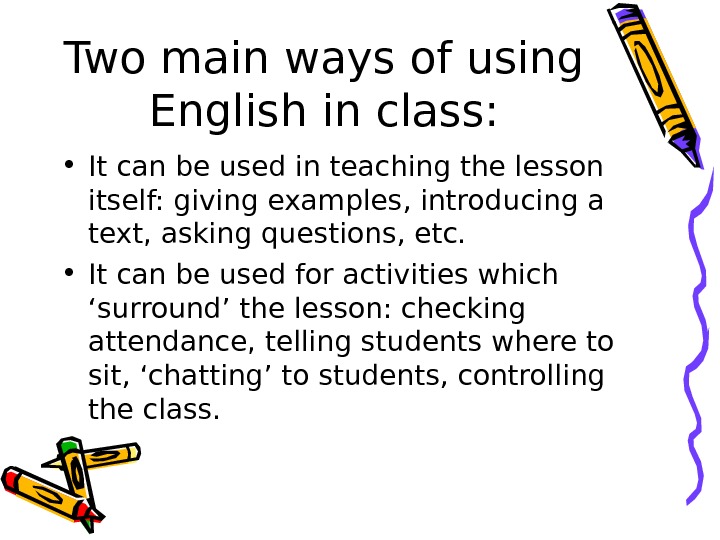

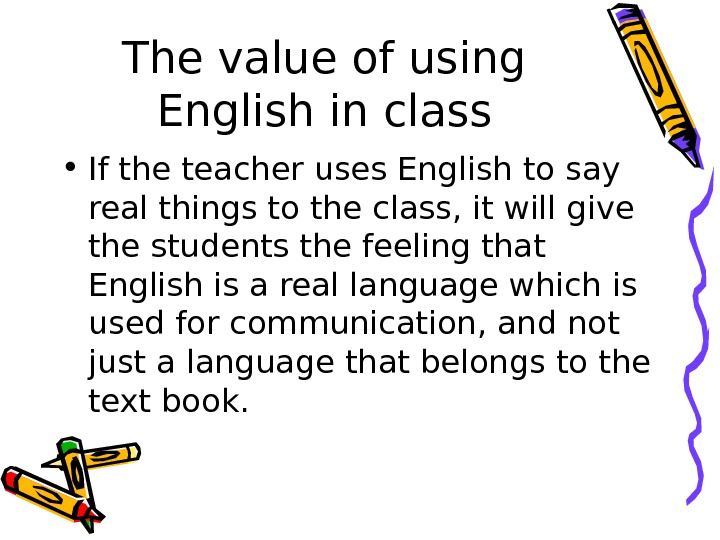
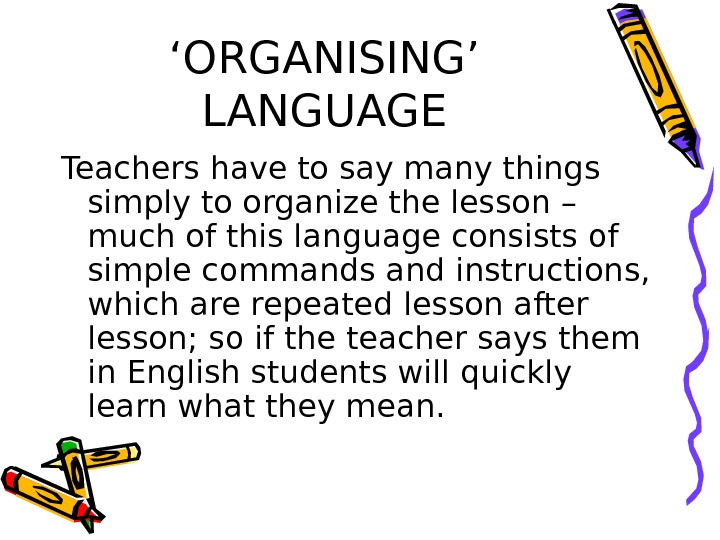
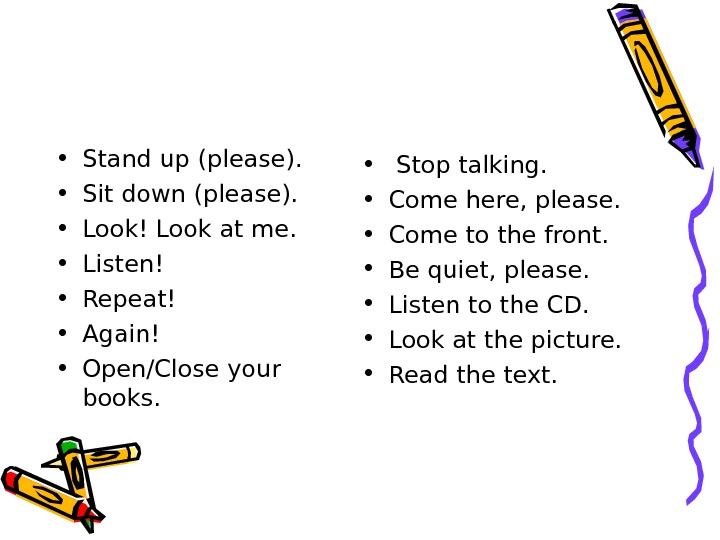
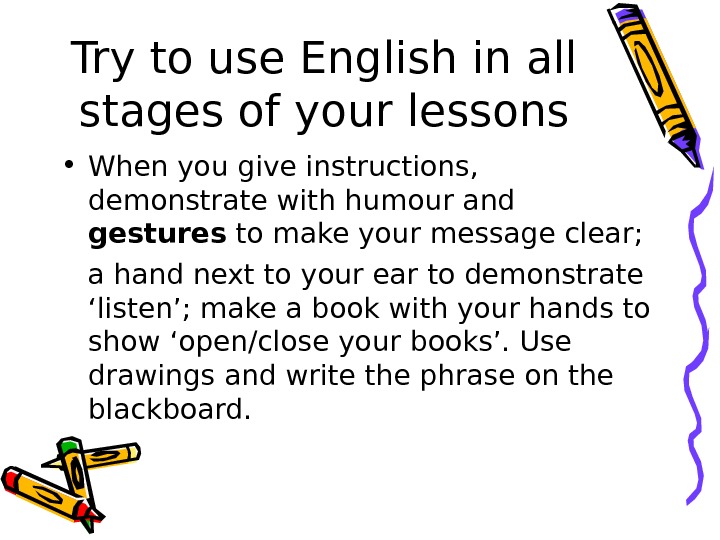
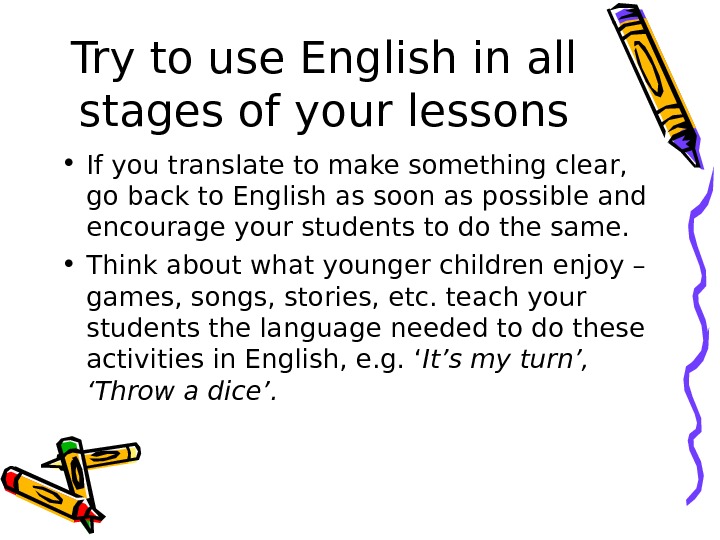
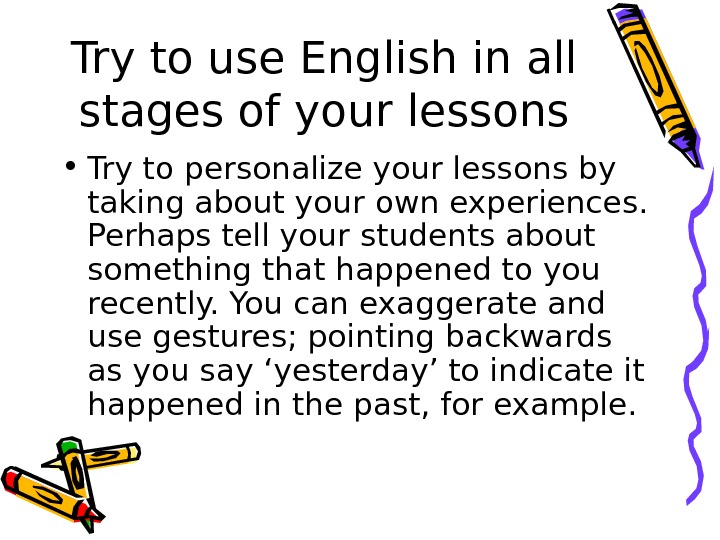
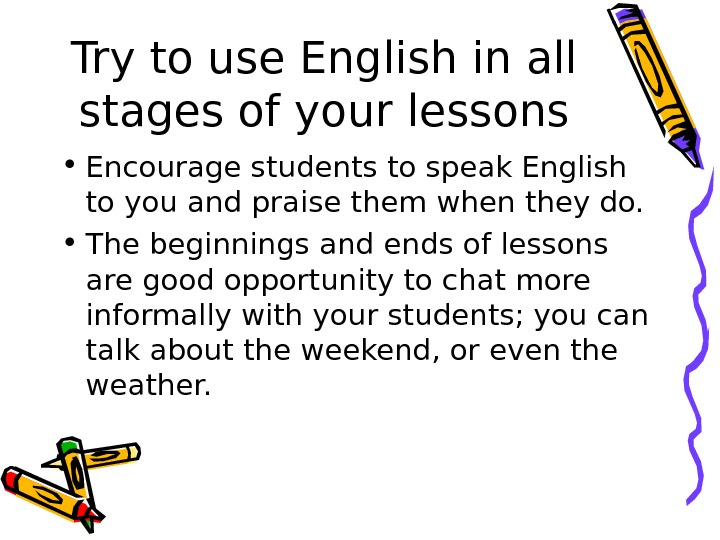
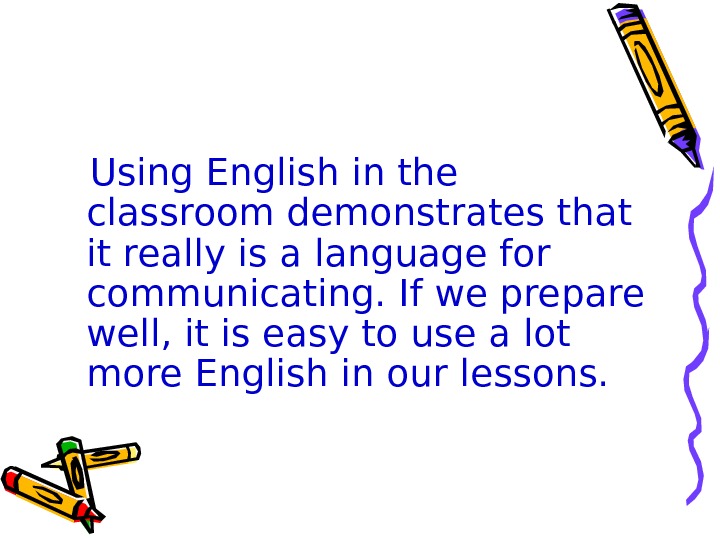
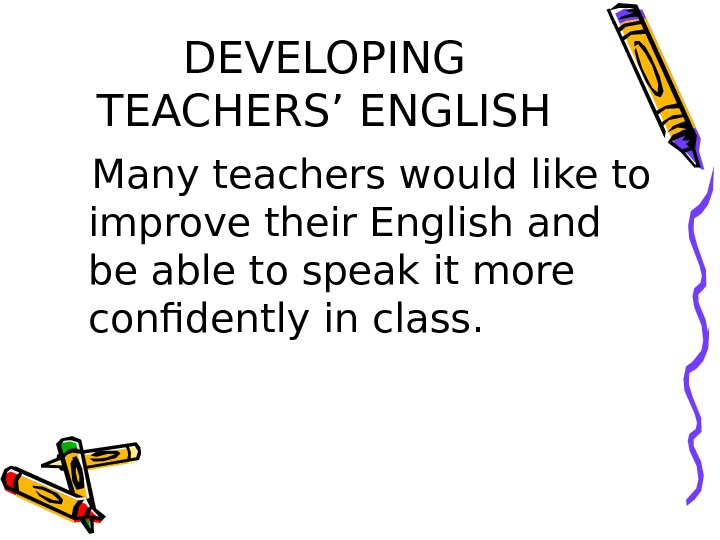
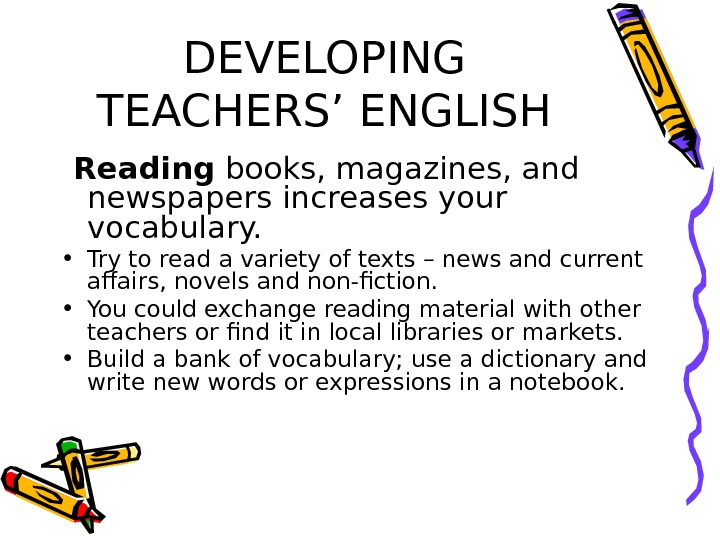
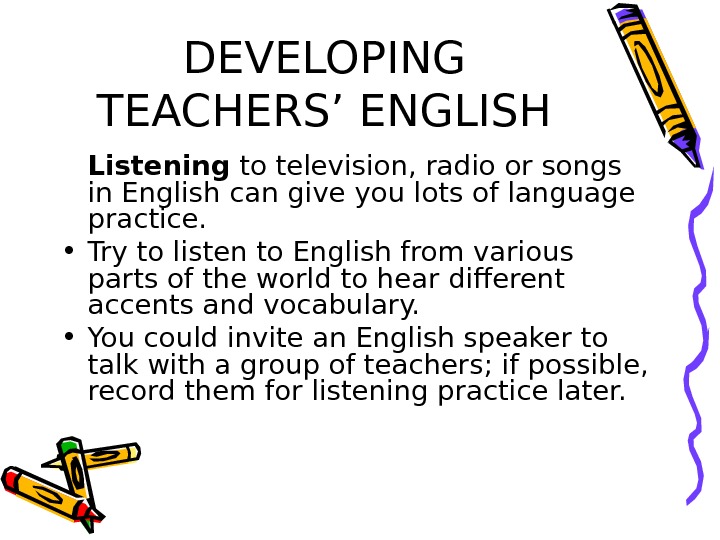
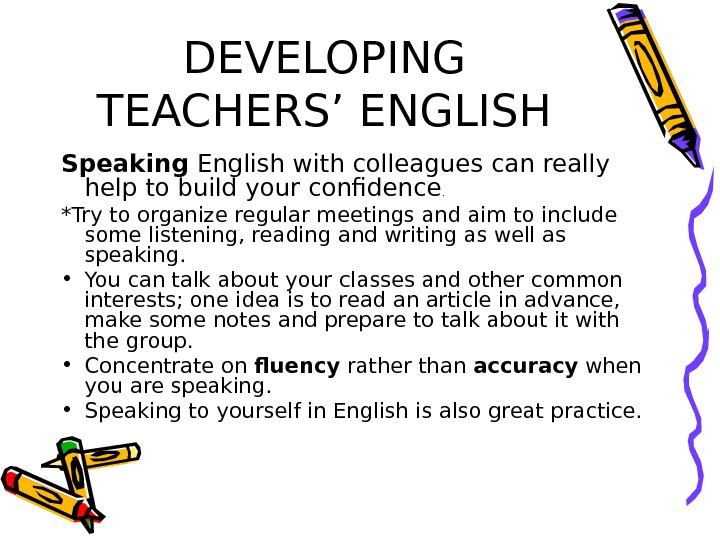
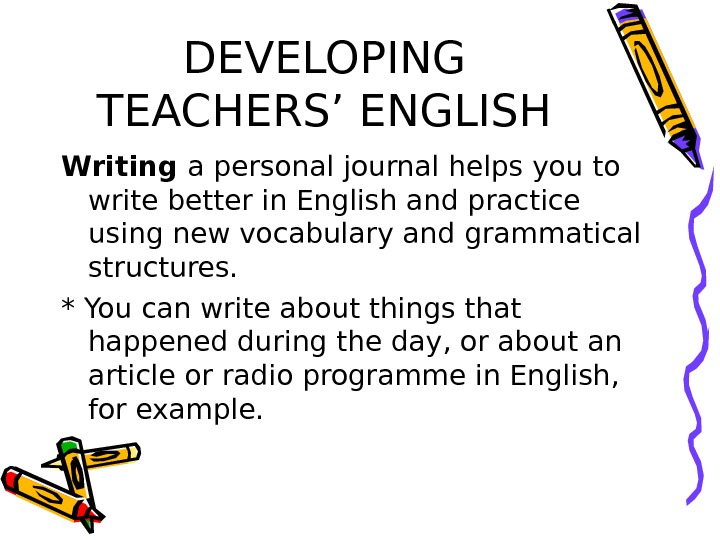

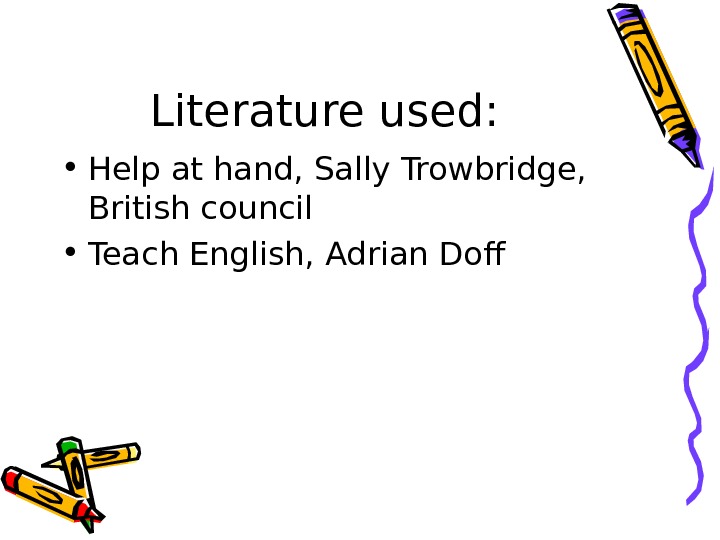

- Размер: 59 Кб
- Количество слайдов: 20
Описание презентации ENGLISH IN THE CLASSROOM Why speak English in по слайдам
 ENGLISH IN THE CLASSROOM Why speak English in class?
ENGLISH IN THE CLASSROOM Why speak English in class?
 ‘ Students will think that English is just for reading, writing and practicing grammar points if we do not speak it in class. ’‘ If the subject you are teaching is English, then you should always try to speak English. ’ Hanan, Egypt Kazimierz, Malasia
‘ Students will think that English is just for reading, writing and practicing grammar points if we do not speak it in class. ’‘ If the subject you are teaching is English, then you should always try to speak English. ’ Hanan, Egypt Kazimierz, Malasia
 Two main ways of using English in class: • It can be used in teaching the lesson itself: giving examples, introducing a text, asking questions, etc. • It can be used for activities which ‘surround’ the lesson: checking attendance, telling students where to sit, ‘chatting’ to students, controlling the class.
Two main ways of using English in class: • It can be used in teaching the lesson itself: giving examples, introducing a text, asking questions, etc. • It can be used for activities which ‘surround’ the lesson: checking attendance, telling students where to sit, ‘chatting’ to students, controlling the class.
 The value of using English in class • If the teacher uses English most of the time, it will give students practice in listening and responding to spoken English. • In the lesson itself, the language used is often unnatural. But the situations that occur in the classroom give an opportunity for real , natural English to be used.
The value of using English in class • If the teacher uses English most of the time, it will give students practice in listening and responding to spoken English. • In the lesson itself, the language used is often unnatural. But the situations that occur in the classroom give an opportunity for real , natural English to be used.
 The value of using English in class • If the teacher uses English to say real things to the class, it will give the students the feeling that English is a real language which is used for communication, and not just a language that belongs to the text book.
The value of using English in class • If the teacher uses English to say real things to the class, it will give the students the feeling that English is a real language which is used for communication, and not just a language that belongs to the text book.
 ‘ ORGANISING’ LANGUAGE Teachers have to say many things simply to organize the lesson – much of this language consists of simple commands and instructions, which are repeated lesson after lesson; so if the teacher says them in English students will quickly learn what they mean.
‘ ORGANISING’ LANGUAGE Teachers have to say many things simply to organize the lesson – much of this language consists of simple commands and instructions, which are repeated lesson after lesson; so if the teacher says them in English students will quickly learn what they mean.
 • Stop talking. • Come here, please. • Come to the front. • Be quiet, please. • Listen to the CD. • Look at the picture. • Read the text. • Stand up (please). • Sit down (please). • Look! Look at me. • Listen! • Repeat! • Again! • Open/Close your books.
• Stop talking. • Come here, please. • Come to the front. • Be quiet, please. • Listen to the CD. • Look at the picture. • Read the text. • Stand up (please). • Sit down (please). • Look! Look at me. • Listen! • Repeat! • Again! • Open/Close your books.
 Try to use English in all stages of your lessons • When you give instructions, demonstrate with humour and gestures to make your message clear; a hand next to your ear to demonstrate ‘listen’; make a book with your hands to show ‘open/close your books’. Use drawings and write the phrase on the blackboard.
Try to use English in all stages of your lessons • When you give instructions, demonstrate with humour and gestures to make your message clear; a hand next to your ear to demonstrate ‘listen’; make a book with your hands to show ‘open/close your books’. Use drawings and write the phrase on the blackboard.
 Try to use English in all stages of your lessons • If you translate to make something clear, go back to English as soon as possible and encourage your students to do the same. • Think about what younger children enjoy – games, songs, stories, etc. teach your students the language needed to do these activities in English, e. g. ‘ It’s my turn’, ‘Throw a dice’.
Try to use English in all stages of your lessons • If you translate to make something clear, go back to English as soon as possible and encourage your students to do the same. • Think about what younger children enjoy – games, songs, stories, etc. teach your students the language needed to do these activities in English, e. g. ‘ It’s my turn’, ‘Throw a dice’.
 Try to use English in all stages of your lessons • Try to personalize your lessons by taking about your own experiences. Perhaps tell your students about something that happened to you recently. You can exaggerate and use gestures; pointing backwards as you say ‘yesterday’ to indicate it happened in the past, for example.
Try to use English in all stages of your lessons • Try to personalize your lessons by taking about your own experiences. Perhaps tell your students about something that happened to you recently. You can exaggerate and use gestures; pointing backwards as you say ‘yesterday’ to indicate it happened in the past, for example.
 Try to use English in all stages of your lessons • Encourage students to speak English to you and praise them when they do. • The beginnings and ends of lessons are good opportunity to chat more informally with your students; you can talk about the weekend, or even the weather.
Try to use English in all stages of your lessons • Encourage students to speak English to you and praise them when they do. • The beginnings and ends of lessons are good opportunity to chat more informally with your students; you can talk about the weekend, or even the weather.
 Using English in the classroom demonstrates that it really is a language for communicating. If we prepare well, it is easy to use a lot more English in our lessons.
Using English in the classroom demonstrates that it really is a language for communicating. If we prepare well, it is easy to use a lot more English in our lessons.
 DEVELOPING TEACHERS’ ENGLISH Many teachers would like to improve their English and be able to speak it more confidently in class.
DEVELOPING TEACHERS’ ENGLISH Many teachers would like to improve their English and be able to speak it more confidently in class.
 DEVELOPING TEACHERS’ ENGLISH Reading books, magazines, and newspapers increases your vocabulary. • Try to read a variety of texts – news and current affairs, novels and non-fiction. • You could exchange reading material with other teachers or find it in local libraries or markets. • Build a bank of vocabulary; use a dictionary and write new words or expressions in a notebook.
DEVELOPING TEACHERS’ ENGLISH Reading books, magazines, and newspapers increases your vocabulary. • Try to read a variety of texts – news and current affairs, novels and non-fiction. • You could exchange reading material with other teachers or find it in local libraries or markets. • Build a bank of vocabulary; use a dictionary and write new words or expressions in a notebook.
 DEVELOPING TEACHERS’ ENGLISH Listening to television, radio or songs in English can give you lots of language practice. • Try to listen to English from various parts of the world to hear different accents and vocabulary. • You could invite an English speaker to talk with a group of teachers; if possible, record them for listening practice later.
DEVELOPING TEACHERS’ ENGLISH Listening to television, radio or songs in English can give you lots of language practice. • Try to listen to English from various parts of the world to hear different accents and vocabulary. • You could invite an English speaker to talk with a group of teachers; if possible, record them for listening practice later.
 DEVELOPING TEACHERS’ ENGLISH Speaking English with colleagues can really help to build your confidence. *Try to organize regular meetings and aim to include some listening, reading and writing as well as speaking. • You can talk about your classes and other common interests; one idea is to read an article in advance, make some notes and prepare to talk about it with the group. • Concentrate on fluency rather than accuracy when you are speaking. • Speaking to yourself in English is also great practice.
DEVELOPING TEACHERS’ ENGLISH Speaking English with colleagues can really help to build your confidence. *Try to organize regular meetings and aim to include some listening, reading and writing as well as speaking. • You can talk about your classes and other common interests; one idea is to read an article in advance, make some notes and prepare to talk about it with the group. • Concentrate on fluency rather than accuracy when you are speaking. • Speaking to yourself in English is also great practice.
 DEVELOPING TEACHERS’ ENGLISH Writing a personal journal helps you to write better in English and practice using new vocabulary and grammatical structures. * You can write about things that happened during the day, or about an article or radio programme in English, for example.
DEVELOPING TEACHERS’ ENGLISH Writing a personal journal helps you to write better in English and practice using new vocabulary and grammatical structures. * You can write about things that happened during the day, or about an article or radio programme in English, for example.
 Find and make opportunities to use your English and don’t worry about making mistakes. As Daya, a teacher in Nepal, says: » English is not your first language. You can be a confident speaker without being perfect. ”
Find and make opportunities to use your English and don’t worry about making mistakes. As Daya, a teacher in Nepal, says: » English is not your first language. You can be a confident speaker without being perfect. ”
 Literature used: • Help at hand, Sally Trowbridge, British council • Teach English, Adrian Doff
Literature used: • Help at hand, Sally Trowbridge, British council • Teach English, Adrian Doff
 THANK YOU FOR ATTENTION !
THANK YOU FOR ATTENTION !
